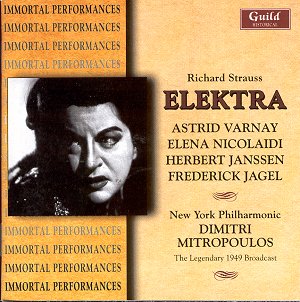In the recorded history of Elektra, this set
would appear to represent something of a dream team, combining as it
does the talents of arguably the opera’s greatest protagonist and conductor
to date. Despite Birgit Nilsson’s subsequent ownership of the role for
a decade from the middle of the ’60s onwards many still regard Astrid
Varnay as the ultimate Elektra. This is with good reason, to judge from
the several recordings left to us: under Reiner in 1952, Richard Kraus
in 1953, William Steinberg in 1956 and Herbert von Karajan in 1964.
This set is now our earliest available documentation of Varnay in the
role, from a concert performance given on Christmas Day 15 years before
that Salzburg Festival appearance with Karajan. It’s worth noting the
technical infallibility and vocal stamina one would need to sing this
role over a period of 15 years, let alone to do so with such terrifying
confidence.
This broadcast is also the earliest account I know
of the score from Dmitri Mitropoulos; though I’m acquainted with performances
from Florence in 1951 (Anny Konetzni) and Vienna in 1957 (Inge Borkh),
I believe there to be several others. Messy ensemble for the opera’s
opening ‘Agamemnon’ motif doesn’t get the opera off to a promising start,
but Elektra’s opening monologue ‘Weh, ganz allein’ finds Varnay tempering
Mitropoulos’s tendency to press ahead with icily powerful blasts of
tone. This broadcast catches her in excellent voice, although in later
years her characterisation of the part would deepen. For Mitropoulos
too, impetuosity is the dominant feature here: the opening of Klytemnestra’s
scene is too fast for full menace to register. As Richard Caniell points
out in some notes that are nothing if not personal (‘the legendary 1949
broadcast… Varnay has never sung better than this, before or since…
Orestes is the name of her sanity’ are some of the more debatable pronouncements)
Elena Nikolaidi does better than many Klytemnestras in actually singing
the part rather than spitting it. Irene Jessner gets around the notes
but doesn’t invest them with the womanly allure offered by Karita Mattila
(in recent memory) or Leonie Rysanek for Kraus. Mind you, she doesn’t
get much chance to make an impact. There is a pause after Klytemnestra’s
scene, possibly occasioned by the demands of the radio broadcast or
a Christmas Day audience. It resumes with Elektra catching sight of
the shadow in the doorway which is eventually revealed as Orest. Poor
Chrysothemis’s second scene therefore is entirely cut and with it that
creepy passage where Elektra casts an insinuating eye over her sister’s
voluptuous body, ripe for motherhood, as Chrysothemis laments the lack
of boyfriend material around the house of Atreus (can you blame them?).
The other parts are fair, nothing more, though it’s a pity Guild couldn’t
find out who half of them were.
The sound and playing under Kraus in studio conditions
remain preferable. The WDR orchestra sounds far more amenable to the
score’s extravagant demands than the reportedly recalcitrant New York
Philharmonic, which in any case never took to Mitropoulos’s driven intensity.
Varnay doesn’t quite go for broke on her opening entry as she did in
1949, but she builds the role with a slow-burning vengefulness that
reaches its peak as Elektra scrabbles in the ground for the axe which
Orest will use to murder their mother. She frequently seems to enjoy
and benefit from Kraus’s more measured tempos with greater accuracy
of intonation and more surely drawn phrases. But no one quite pulls
the score round like Mitropoulos. Despite the fast tempos, his knowledge
of the score pays dividends at moments of otherwise bewildering complexity
like the arrival and departure of Klytemnestra where he is unmatched
at drawing out the music’s strands. He can also stretch the big moments
to realise perfectly the score’s unsettling combination (often simultaneous)
of lyricism and violence, notably at the gloriously OTT conclusion,
as Elektra dances herself to death. The Vienna performance from 1957
finds Mitropoulos in far more contemplative mood, dwelling on phrases
more and spotlighting motifs from within the orchestra. If only the
sound were not so crumbly this would be far more recommendable. The
Florence version is likewise sonically inferior, though the faults are
quite different; where the voices veer in and out of recession in Vienna,
the Florence version is in a disconcertingly vivid electronic stereo,
the focus of which wanders across the sound stage and makes me feel
seasick when listening on headphones. This is a pity, because the orchestra
is again extremely incisive and gutsy. Konetzni’s overcooked Elektra
also disappoints.
The bonuses on Guild (Varnay in Senta’s ballad, bits
and bobs from Boccanegra, Ballo and Herodiade inter alia) and Gala (substantial
chunks of an Act I of Rosenkavalier with Varnay as the Marschallin from
the Met with Reiner in 1953) are both appealing. Richard Tucker and
Leonard Warren partner her in the two extracts from Act I of Boccanegra
to especially thrilling effect, (and Weber’s Ozean, du Ungeheuer receives
as full-on a performance as I’ve ever heard). If a partial version of
Elektra doesn’t bother you, this set certainly offers a white-knuckle
90 minutes and a valuable chance to hear Varnay in full flight.
Peter Quantrill
See also review by Robert
Farr and Calvin Goodwin


